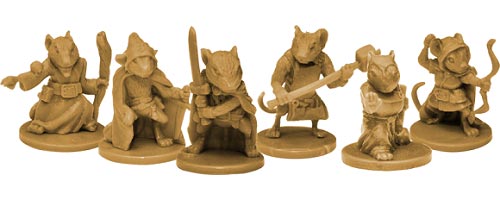(from Brendan)
Mice and Mystics, a dungeon crawler with a family theme, has surprisingly complicated rules for a game about mice with swords. There are several actions players can take during their turn, including “Explore,” which essentially means “leave one tile for another tile.” With the exception of one scenario late in the game, this is something you can do automatically — if the enemies on the board are dead and you have an action to take, you can “explore” and take the party to the next tile. Alas for me and the first game of Mice and Mystics we played, the rules were written to account for that scenario.

The crux of the problem is a single word, part of that rule. It says “a mouse can attempt to move to a new tile.” The other half of the problem for me was that at other places in the game, when you ‘attempt’ something, you have to roll a die, trying to get an asterisk. Since the rule said “attempt,” I presumed this was something you could fail. And we spent much of the first game playing with my made-up ‘attempt’ roll in place. Since Mice and Mystics also punishes you for going too slowly on an empty board, we encountered way more monsters than we should have, and the game took a lot longer than it was supposed to. All from one word.
We did some play testing last week, and found generally positive results for the game we’re bringing out first, Battle Rox. The event went well, with all players indicating they’d like to play the game again and some even playing two games in the same night. But it wasn’t all honey and roses.
One of the main tasks I’ve spent my time working on is the tricky translation of game idea into rulebook. You want something that’s fun, that’s easy to read, that gets players interested, that keeps them interested, and that, well, explains the rules well enough for them to play. And the rulebook did that, sort of. But it also missed a few key components–ideas that, by leaving them out, made the rulebook too messy to use. It was sobering watching our play testers in the “no help” room flounder to figure out what I meant by the carefully-edited text I’d given them to read. It turns out, I had many attempt words of my own.
We took the feedback and have been developing a new rule book that is more in line with the experience people will actually have. Here’s hoping the new version better explains the game, and doesn’t leave people rolling a dice when they don’t need to.
Readers — when have you found yourself stymied by a rulebook? What made it difficult? Let us know in the comments!
